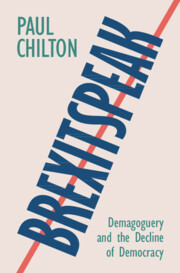Book contents
- Brexitspeak
- Brexitspeak
- Copyright page
- Dedication
- Contents
- Figures
- Acknowledgements
- Introduction: Populists, Demagogues, Language
- 1 Identity
- 2 We
- 3 The People
- 4 The British People
- 5 Fear of Foreigners
- 6 Fear of Foreigners Mobilised
- 7 How Demagogues Do It
- Conclusion: Brexitspeak, Demagoguery, Decline of Democracy
- Book part
- References
- Index
6 - Fear of Foreigners Mobilised
Published online by Cambridge University Press: 22 November 2024
- Brexitspeak
- Brexitspeak
- Copyright page
- Dedication
- Contents
- Figures
- Acknowledgements
- Introduction: Populists, Demagogues, Language
- 1 Identity
- 2 We
- 3 The People
- 4 The British People
- 5 Fear of Foreigners
- 6 Fear of Foreigners Mobilised
- 7 How Demagogues Do It
- Conclusion: Brexitspeak, Demagoguery, Decline of Democracy
- Book part
- References
- Index
Summary
The rise of UKIP began in the 1990s under the leadership of Nigel Farage, another admirer of Powell. From the 1990s on, prominent Conservative Party figures spoke against what they regarded as the foreignization of Britain, sometimes overtly sometimes by insinuation. The latter approach was continued in the malevolent poster slogans of the Conservative campaign during the 2005 general election. After the Conservatives gained power, this activity continued in the even more aggressive ‘hostile environment’ campaign. By the time of the 2016 referendum, anti-immigrant sentiment was mobilised in various ways that included hints and allusions, the citing of misleading statistics, emotive metaphor and barefaced reiteration of untruths. The most blatant example was the pro-Leavers’ assertions that Turkey was about to join the EU, contrary to the well-known fact that Turkey’s application was indefinitely stalled because of its human rights record. In Brexit propaganda, the danger of Turkish accession was tacitly racist, and represented in terms of an ‘invasion’ of the British Isles. The workings of these various types of truth-twisting are examined in depth in this chapter.
- Type
- Chapter
- Information
- BrexitspeakDemagoguery and the Decline of Democracy, pp. 126 - 146Publisher: Cambridge University PressPrint publication year: 2024

